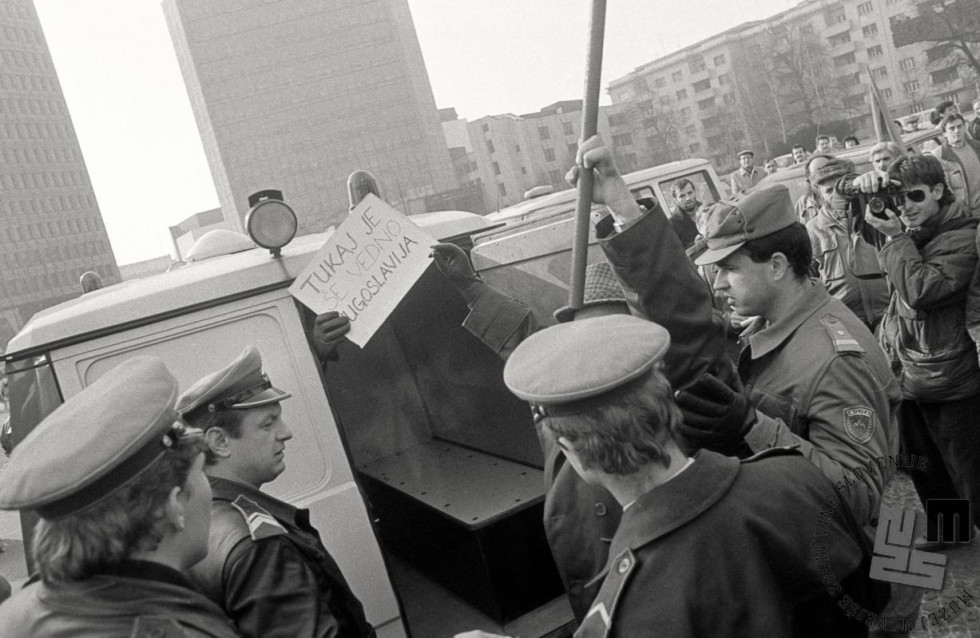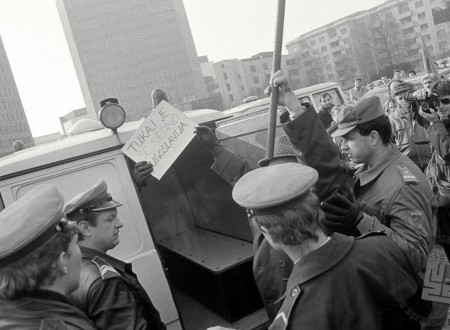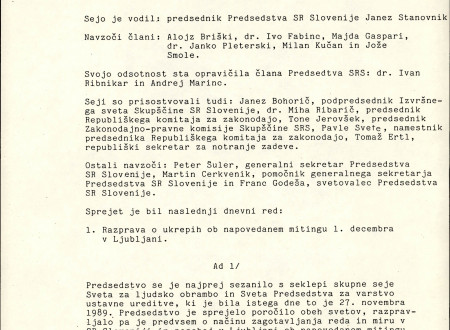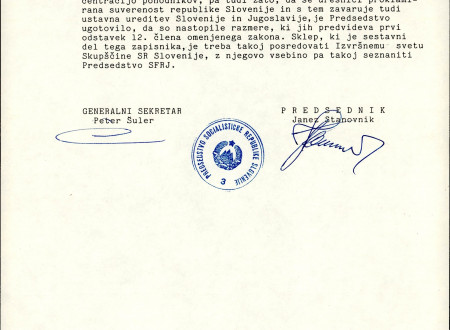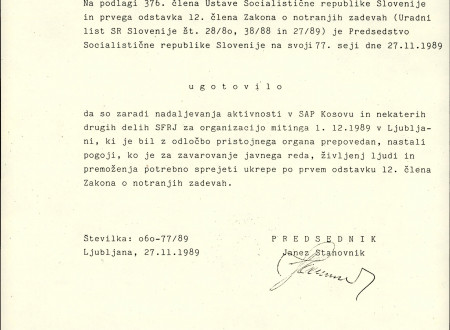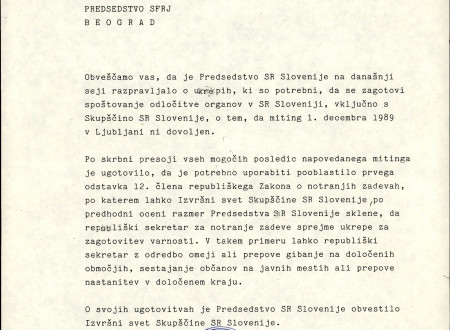30th Anniversary of a Decisive NO to the Rally of Truth in Ljubljana
Minutes of the 77th Session of the Presidency of the Socialist Republic of Slovenia
The document presented here as this month's archivalia takes us 30 years back, to a time of uncertainty in European history. It was a time of »peaceful revolution« in the former German Democratic Republic, a time of the fall of the Berlin wall, which stood as a symbol of division between the East and the West, and a time which set us on the path to unification of the two Germanies in 1990. Student protests started »velvet revolution« that eventually brought about the fall of the communist regime in Czechoslovakia and the formation of two separate states, Czech Republic and Slovakia.
In former Yugoslavia the political situation was also becoming increasingly uncertain. Federal authorities were helpless and had no real authority, while the Yugoslav People’s Army and its generals began to seriously interfere with the rule of the state. In Serbia, Slobodan Milošević came to power and his first intention was to subject Yugoslavia to his ambitions by re-centralizing it. In 1986, Serbian Academy of Sciences and Arts issued a memorandum in which Serbian members of the academy talked openly about the Serbian question and called for the creation of the so called Greater Serbia. Serbs were being prepared for this new politics through propaganda in the press and on television. Milošević was received as the absolute national leader and he further strengthened his authority by holding a number of “march rallies”.
The first rally was held on July 9, 1988 in Novi Sad and was organized by Kosovo Serbs under the leadership of Miroslav Šolević. Masses were mobilized, starting the so-called “anti-bureaucratic revolution”, whose goal was to overthrow political leaderships that opposed the idea of the joining of all Serbs in one state. Such rallies, which initially were of spontaneous nature, came under Milošević’s control; according to State Security Service reports, the leaders of the rallies were being instructed directly by Milošević through his closest associates. The government of the autonomous province of Vojvodina was the first to fall. Then came a series of rallies held in other cities of Vojvodina (Pančevo, Nova Pazova, Titov Vrbas). On January 10, 1989, 150,000 people gathered at the rally in Titograd in Montenegro and overthrew the government there. Organization of rallies then moved on to the territory of Bosnia and Herzegovina and Croatia and eventually reached Slovenia.
The Slovenian public was first informed about the announcement of the rally in Ljubljana on November 4, 1989, when the newspaper Delo published the news from Priština which it had received from the state news agency Tanjug. According to the news, the Committee of the Association for the Return of Serbs and Montenegrins to Kosovo – Božur sent a letter to Slovenian alternative associations and to the Central Committee of the League of Communists of Slovenia, urging them to allow a peaceful protest to be held in Ljubljana in December 1989. They claimed they wished to come to Ljubljana to join the Slovenian nation in remembering the fateful historical moments of the past of both nations and, by doing so, change the ugly present time. First official response from Slovenia is believed to be made on November 7 at the session of the Executive Committee of the Republic Council of the Socialist Union of Working People, where they rejected the initiative for such a rally, saying they objected to such import/export of rallies. The executive committee also believed the date chosen for the rally, December 1, to be somewhat provocative, since not all nations and nationalities had fond memories of December 1, 1918. Negative reaction appeared in the Slovenian media already days after the rally announcement had been published. The rally was officially banned on November 20 by the decision issued by the Ljubljana City Secretariat of the Interior. The decision was supported by all the highest ranking Slovenian republic authorities (the assembly, presidency, executive council) and a number of socio-political organizations (Socialist Union of Working People, trade unions …). Slovenian Writer’s Association, Slovenian Democratic Union, Social Democratic Union of Slovenia, Committee for the Defence of Human Rights, Slovenian Christian Democrats, Slovenian Farmers’ Union and Greens of Slovenia made an appeal to Slovenian authorities and Slovenians which was published in the newspaper Delo on November 28. In it they wrote that: “Rally-goers and the ones who stand behind them should know that the decision about what kind of government the Slovenians wish to have will be made by Slovenians alone in free elections.” They called for general strike.
The response of the rally organizers to the negative reactions coming from Slovenian political leadership and most of the Slovenian public intensified over time. In their statements the organizers said that Slovenian nation was “blinded and manipulated” by its media, that people of Slovenia were essentially good and only rejected the rally because they were being lied to by the Slovenian political leaders. Milanko Buljugić, the secretary of Božur, stated that they would go through with the rally even if there were casualties, and that Slovenian political leaders would be the one to blame for such casualties. As statements of rally organizers became more and more forceful, so did the “no to the rally” in Slovenia become more and more decisive and resolute.
At its session on November 22, the Assembly of the Socialist Republic of Slovenia (SRS) ordered state authorities to consistently enforce the ban on the rally. The demand led to the discussion in the republic executive council, where the situation was addressed and a firm decision was made to protect public law and order and enforce the ban on the rally.
At its session on November 27, the Presidency of SRS noted that preparations for the banned mass meeting were still in progress, creating a situation which called for measures to be taken to protect the lives of the people, public order and safety of property in accordance with the first paragraph of article 12 of Internal Affairs Act. Slovenian presidency informed the Presidency of the Socialist Federative Republic of Yugoslavia about its decision. In accordance with this decision, the Executive Council of the Assembly of the SRS ordered the Republic Secretariat of the Interior to take the necessary safety measures. This gave the republic secretary Tomaž Ertl the authority, if needed, to issue decrees on restricting or prohibiting any movements of people in certain areas, the gathering of citizens in public places, and organized arrival to the meeting, thus ensuring compliance of the ban. On November 29 the republic secretary issued three decrees on restriction of movements, gathering and accommodations in Slovenia. All three decrees came into force on November 30.
As “rally goers” in Kosovo, Vojvodina and Montenegreo fervently prepared to depart for Slovenia, the Republic Conference of the Socialist Union of Working People of Serbia made a public call for all authorities and organizations in Serbia to cut off their contacts with Slovenia. As soon as the call was published, Božur in Kosovo decided to cancel their rally of truth in Slovenia, which was followed by cancellations from rally organizers in Vojvodina and Montenegro.
On December 1 only a small group of people gathered at the Republic Square in front of the former socialist assembly, most of them were Serbs who were living in Ljubljana at the time.
Vesna Gotovina


